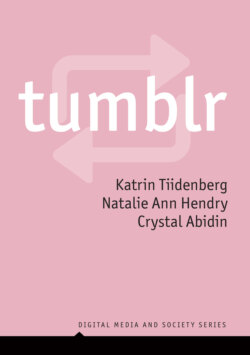Читать книгу Tumblr - Tama Leaver, Crystal Abidin - Страница 12
Magic and frisson
ОглавлениеBut what was this “magic” and “frisson” that tumblr once brought? What are – or were – those engaged, invested users doing on tumblr? Why do or did they log on? Why are tumblr users and tumblr scholars so sure, when they say that tumblr is special and played a key role in the digital culture of the past decade? A strong pattern emerges from qualitative, immersive research. Conversations around fandom (Bourlai 2018; Burton 2019; Hillman et al. 2014), feminism (Connelly 2015; Keller 2019), LGBTQIA+2 experiences (Byron 2019; Cho 2015a; Feraday 2016; Fink and Miller 2014; Haimson et al. 2019; Oakley 2016), and NSFW topics (Mondin 2017; Tiidenberg 2014a, 2020; Tiidenberg and van der Nagel 2020) are all highly visible on tumblr. So are the users’ commitments to social justice (Burton 2019; Wargo 2017a) and mental health (Cavazos-Rehg et al. 2017; Hendry 2020a; Seko and Lewis 2018) while having those conversations. Further, across these interests and commitments, users have told researchers that their tumblr experiences are communal, consciousness-raising, therapeutic, and educational (Chew 2018; Hendry 2020b; McCracken 2017; Tiidenberg 2014b, 2017). People often feel that on tumblr they can truly be themselves (Renninger 2014; Tiidenberg 2013). tumblr users seem to be quite self-aware about the platform’s role in their lives. Posts listing “things tumblr has taught me” are so common they can be considered a platform-specific meme (Figure i.1; see Chapter 5 for a discussion on tumblr pedagogies, and Chapters 6 and 7 on learning in specific groups and communities). Some of these lists are serious, others are funny, yet others deeply sincere. Many are everything at once.
Figure i.1: Artist’s impression of a now-deactivated blog post from 2015 listing “Things tumblr has taught me,” with approximately 30,000 notes. Art provided by River Juno.
Most statistics show that tumblr’s user base has always been predominantly composed of young people or millennials (variously recognized as born between the early 1980s to the late 1990s; Petrov 2020), with some growing up on the platform through their teen years into their twenties and thirties. In part, the youthful nature of the platform explains why it was a place for learning and for people to “find themselves” (see Chapters 2 and 5). This narrative of tumblr having had a profound transformative and educational impact on (young) people is reproduced by journalists. tumblr is credited with having “taught social justice to a generation of teenagers” (Sarappo 2018), “taught the world how to speak Australian” (Nye 2017), taught writers to write (Manley 2013), taught youth about nonbinary gender identities (Arscott 2018), and offered them “a means of survival” (Morris 2019). However, many of these narratives are veiled in nostalgia, deeming circa 2012–14 as tumblr’s heyday and presuming that it no longer offers these things (Jennings 2020; Morris 2019). As tumblr researchers and authors of this book, we grappled with the same sentiment (we will return to the notion of “lost” tumblr and tumblr’s demise in the Conclusion). Yet, the “#what tumblr has taught me” hashtag keeps returning results every time we conduct a search. A brief walkthrough (Figure i.2) shows that in 2020, tumblr users are still learning and still crediting tumblr with it.
Of course, tumblr is not a utopia. There are conflicts, arguments, toxic dog piling, and trolling between users (see Chapter 5 for a discussion on call-out cultures). The general consensus, however, seems to be that compared to most alternatives, tumblr has offered an inhabitable space for people and communities, especially those with minoritarian experiences, identifications, lifestyles, and values. As noted in the roundtable interview published in The Ringer, tumblr “felt friendlier than other famously weird internet zones like Reddit or 4chan. I still felt like I was on a cool detour, but I wasn’t in the Wild West, you know?” (Bereznak et al. 2017).
Figure i.2: Artist’s impression of a collage of some posts under “#what tumblr has taught me.” Art provided by River Juno.
Overall then, tumblr has been formative of the worldviews and identities of many (mostly young) people; has played a significant part in elevating conversations on gender, sexual identities, intersectionality, and cultural representations thereof; and has launched, or at least played an instrumental role in, various social movements, such as Occupy and Black Lives Matter (Baptiste 2017; Safronova 2014; Sutter 2011; see also chapters in McCracken et al. 2020). Some think that tumblr’s 2010 meme war with 4chan served as a direct precursor to the polarization that characterizes our current (online) opinion space (Rosenberg 2020).3 Despite all of this, tumblr remained an obscure, cult-like subculture to nonusers, a space difficult to “crack” for marketers, and a platform to which little or no attention was paid by academics outside research on fandom or queer youth. Why?
